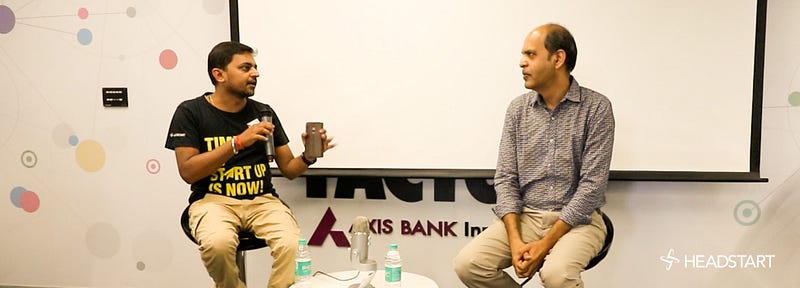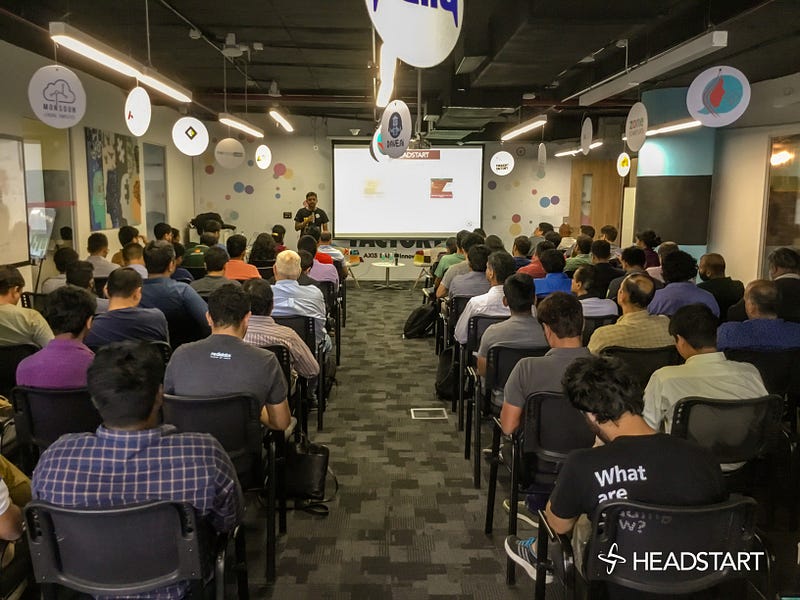It’s not easy building for a billion users, especially when at least half of them are just getting introduced to the internet…
Kapil Raizada, Co-founder of RailYatri — India’s № 1 mass market, long-distance travel consumer platform that serves over 12 million travellers every day, was one of the speakers at the September edition of Startup Saturday Bangalore. He shared these tips with us in a live discussion with the audience curated by Ujjwal Trivedi, a Headstart volunteer.

1. It’s never too late to get started
You can start at any time as long as you’re solving the right problem for the consumer. But first, know if you’re ready for the risks.
Kapil Raizada started RailYatri along with his friend at the ripe age of 42. An age when, in most homes, expenses start growing as parents get older and children are ready for college. Also, corporate growth starts stagnating at this time for a majority of people.
So get a good idea that solves a real problem, prepare a strong pitch, launch a pilot and get a good investor & within 12–18 months you will know if your business is feasible.
2. Reaching a state of confidence is a myth for startups
Getting money and investment may provide some level of confidence, but whether your startup will be a winner in the space is something you can never be sure of.
If you get too confident, there are chances of becoming complacent and not identifying key issues.
It’s ok to be a bit nervous as it will keep you alert to prospective threats. One should always be ready for surprises and be vary of the risks involved.
3. Start a business that gives real value to its users
At RailYatri, the team drilled down to research that helped them identify information that train travellers searched for most often online. And they set out to provide the most accurate answer possible for that questions.
They built advanced algorithms that help provide better accuracy than was available in the market.
Simple questions like what time will my train reach, which station has the train crossed and which platform will the train stop at, were answered with such accuracy that it set a new benchmark.
If you’re answering the right question you can build loyalty over time.
4. It’s always the right time to look for funding
Start pitching to investors as soon as you’re confident of your product. It’s best to sell as much as you can because chances are you’re going to fail 9 out of 10 times.
It’s better to fail fast and so that you can learn and set things right. While approaching investors, go with a purpose, a goal to raise money. It takes at least a year to get your first round in. So if you think you have your vision right you should start meeting investors immediately.
5. Find Solutions that create a high social impact
Even if your business is not yet bringing in money but is helping solve an inherent social issue or is highly innovative and providing a disruptive solution, investors will be interested in you.
Your solution should help in empowering a segment of the population.
RailYatri did the same thing, and they managed to get their first investment even before making a single rupee from their customers.
6. Get started with the bare necessities
There’s no need to invest heavily in an office space or build a big team before your proof of concept gets validated.
When RailYatri was ready to get started they outsourced the development work to two developers via an outsourcing team and worked with them to till they got some stability in the market. Once the first round of investment came in, they took office space on rent and hired full-time employees.
7. Find a co-founder who complements your skills
Kapil Raizada partnered with a good friend and old colleague who he knew had skills that would balance off well with his. While Kapil had over 14 years of experience as a product manager, his partner Manish was an operations expert. This helped in bouncing off ideas, getting a new perspective to situations and finding innovative solutions that would further the business.

8. Use innovative, unconventional marketing hacks
Do some deep-diving to find out the various avenues that would be happy to promote you for free.
At RailYatri, the team found out that all newspapers have specific correspondents dedicated to trains. Soon they built a database of city-wise correspondents and created relevant content that they were happy to publish for free.
For example — In a Mandya newspaper, they would provide an article on ‘10 Mandya to Bangalore trains to avoid during the Peak Summer Holidays’, which the paper would be happy to publish as it provided useful information to their readers.
9. The future holds a lot of opportunities
Every problem that gets solved gives birth to another problem.
For example, the consolidation in the travel sector will lead to bigger players growing bigger. This means they may miss out on smaller problems, and that’s a good opportunity for small players. So look out for the right opportunities as there’s enough money in the market for the right set of ideas and commitment.
Thank you for reading.
If you enjoyed this article, please share it with others who might enjoy it as well.
If you are interested in getting updates about the Indian startup ecosystem & events we conduct around the country, please subscribe here.
Headstart is one of India’s oldest and largest startup ecosystem development organisations established in 2007 with the vision of ‘changing the world through entrepreneurship’. It is a non-profit, run entirely by 120+ passionate volunteers across 23 cities.
Interested in volunteering with us? We’re always looking for passionate & driven folks who want to give back to the startup ecosystem. Apply here.
Contributed by:
Ashika Devi
Volunteer- Headstart Bangalore